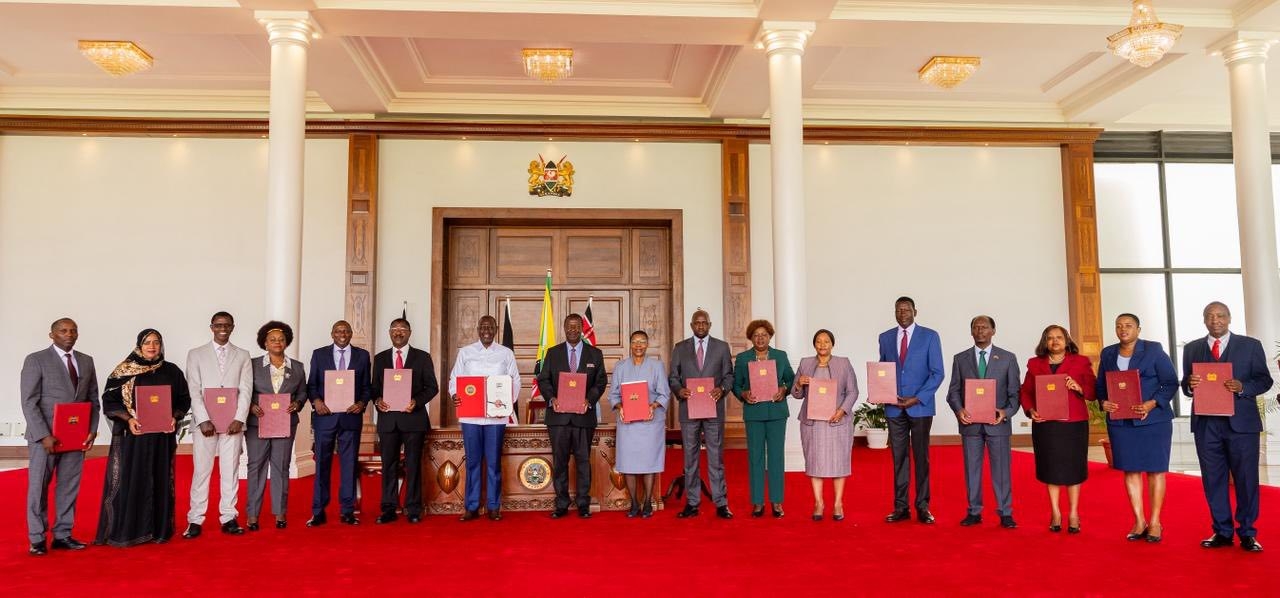For the last 60 years since Kenya gained independence, the education sector has been on a constant change.
This follows the development of three curricula to accord with the changing job market.
From Free Primary Education and Subsidised Secondary Education that saw floodgates flung open for millions of learners from poor backgrounds, to infusion of technology in teaching, the sector has remained dynamic and responsive to change.
The first was 7-4-2-3 System of Education, which was used between 1964 and 1985 but got reformed to help equip learners for work environment.
This curriculum entailed seven years of primary schooling, four years of lower secondary (form 1 -4), two years of upper secondary (form 5-6), and three years of university.
This system did not include the 'pre-primary' schooling for children aged below six years.
The 7-4-2-3 System of Education had been in play before independence and was also used by the East African community until 1977.
Kenya continued with 7-4-2-3 but changed the examination names from their regional identity to a national identity.
The East African Certificate of Primary Education was renamed the Certificate of Primary Education- awarded after seven years of primary school - the first time the CPE was marked by a computer system.
The East African Certificate of Education became the Kenya Certificate of Education, awarded after four years of secondary school.
The East African Advanced Certificate of Education became the Kenya Advanced Certificate of Education awarded after two years of high school.
The changes were expected to reflect the nation's sovereignty.
However, the 7-4-2-3 system faced criticism before it was phased out.
For instance, there were complaints that it lacked the capacity and flexibility to the changing aspirations of Kenyans and what the labour market needed.
This was particularly in terms of new skills, new technologies and the attitude to work.
The curriculum was also accused of being too academic and lacked orientation to employment.
Among those who made calls for change of educational policy were, the Kenya National Assembly’s Select Committee on unemployment in 1970.
In 1985 former President Daniel Moi oversaw the introduction of the 8-4-4 system of education.
This was when CPE was renamed to KCPE and KCE became KCSE.
Learners attended primary school for eight years, sat for KCPE and proceeded to high school, where they sat for KCSE.
They then proceeded to tertiary education for four years.
After 38 years, 8-4-4 has finally been fully phased out in primary schools and learners are now set to study under the Competency Based Curriculum, launched in 2017.
Under CBC, 2-6-6-3, learners will have two years in pre-primary school, then six years in Junior school before proceeding for another six years in senior schools.
The last three years will be for tertiary education.
Presidential Working Party on Education Reforms chairman Raphael Munavu said it is key that education systems be reviewed periodically due to changes in the environment such as technology, new aspirations of young people and even Climate issues.
He said the taskforce wanted to inculcate competency and talents for the Kenyan learner.
"The best way to do that is to have an education system that promotes these talents," Munavu said.
He said the aim was to give learners value-based education and not just equip one with knowledge they cannot apply anywhere.
"What is important is how a learner uses this knowledge. Education shouldn't be domiciled to exams only," he said.
In his opinion, CBC will allow parents to know more about the capabilities of their children
Education Activist Muthoni Ouko said CBC will help in tooling children with competencies and skills.
"The 8-4-4 was being blamed for producing children that cannot do anything else apart from cramming and restating facts," she said.
By introducing practical skills in CBC, Ouko said it will ensure that children are able to apply what they are reading in the books.
"This will go a long way in giving us practical graduates. People who can be able to apply skills in the job market," she said.
"Another big critic of 8-4-4 that really validates the introduction of CBC is the fact that 8-4-4 only takes care of children that are gifted in their cognitive ability and totally ignored everything that a child is gifted in," Ouko said.
She said CBC will help solve a lot of the problems the country is currently facing if it is well implemented with adequate resources.
"8-4-4 did not fail because it was essentially bad. It was a good idea but due to underfunding it was mutilated. Even CBC is very good but if we continue with the trend that we are seeing of underfunding, all the practical components will be mutilated and we will be left with a shell," Ouko said.












